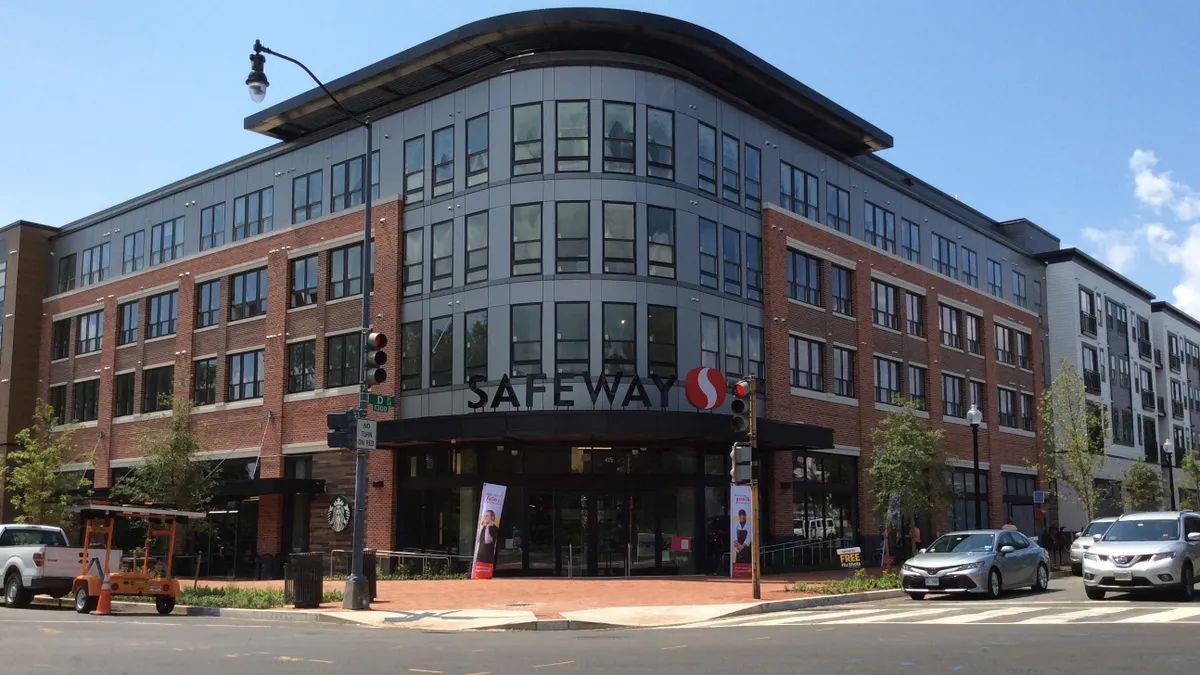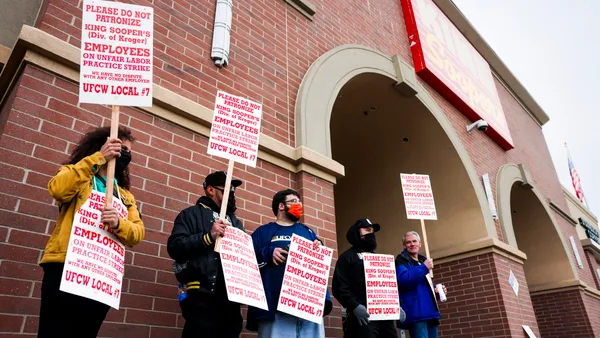Dive Brief:
- Albertsons posted digital sales during the first quarter of fiscal 2021 that were "virtually flat" compared with the same period in 2020 but up 276% over the level recorded during Q1 of 2019, the supermarket chain announced Thursday.
- Identical sales during the quarter, which ended June 19, were down 10% on a year-over-year basis, but up 16.5% compared with the same period two years ago.
- Albertsons, which raised its full-year guidance with the Q1 results, has seen traffic in its stores increase in recent weeks as pandemic-related restrictions have eased.
Dive Insight:
Even as it continues to deal with the challenge of comparing sales in 2021 with the extraordinary gains it saw last year, Albertsons is pointing to the sustained customer interest in online shopping as a sign that its business is stronger now than it was before the pandemic.
Albertsons had 3.6 times as many omnichannel shoppers during Q1 than it did during the same period in 2019, and found that customers who make purchases in stores and online spend significantly more than those who shop exclusively in stores, President & CEO Vivek Sankaran said during Thursday's earnings call. In addition, while the company's omnichannel customers boosted their spending in Q1 compared with that period last year, in-store-only shoppers spent less by the same measure, Sankaran said.
E-commerce transactions were higher in Q1 than they were a year ago, but that has been offset by the fact that basket sizes have declined, Sankaran said.
Albertsons also benefited from its traditional focus on fresh offerings, with sales of those items outpacing center-store sales by 2% in Q1 compared with the first quarter of 2019, according to Sankaran. Sankaran attributed that trend in part to the fact that more people are working from home on some days and preparing more meals as a result.
"We've seen customers shopping in our stores more often, and continue to see fresh as a driver for growth," he said.
Albertsons is also continuing to expand its private label business. Penetration was 25.2%, up more than 1% on a year-over-year basis. The company launched 318 new private label items during Q1, and is on track to bring out more than 800 products under its house brands in 2021.
Sankaran said Albertsons' pickup operation, known as Drive Up & Go, has continued to perform strongly and was the fastest-growing component of the company's business during Q1, rising 75% year-over-year. Albertsons added 320 new Drive Up & Go locations during the quarter and now offers the service at 1,740 stores, he said. By the end of the second quarter, Albertsons expects to offer the pickup service at 1,950 locations, according to Sankaran.
Sankaran noted that Albertsons has not seen a significant impact on its operations from the labor shortage that has recently been affecting retailers, restaurant operators and other employers. The company is experiencing an increase in turnover and facing difficulty filling positions in certain markets and in some distribution centers, but so far has been able to deal with those challenges.
"We're in a place where we can still quite comfortably cover it with overtime and things like that, so we feel good," Sankaran said, adding that he believes Albertsons enjoys an advantage in competing for workers because its union contracts typically mean that its wages are higher than other retailers.
Albertsons raised its outlook for the remainder of 2021 as a result of the retailer's performance in Q1, Chief Financial Officer Bob Dimond said during the earnings call. The company expects identical sales to be higher than it previously forecast for the rest of the year compared to the same period in 2020 and 2019, and projects that its adjusted EBITDA will also be higher.
"Our competitive advantages, and the underlying stickiness of the business gained during the pandemic, as well as the ability to pass along modest inflation and the continued consumer demand for premium items, gives us confidence in the strength of the business for the balance of the year," Dimond said.
Albertsons benefited in Q1 from higher-than-expected revenue attributed to its role in administering COVID-19 vaccines, Dimond said. Albertsons opened five new stores, closed five stores, and remodeled 33 existing locations during Q1, he added.













